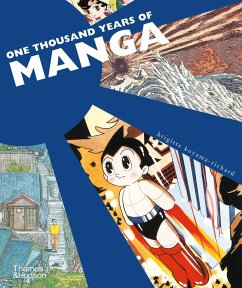A rich, vibrantly illustrated account of the history and sources of manga
As contemporary as this graphic art form may appear to readers outside of Japan, manga has, in fact, deep roots in Japanese culture, drawing on centuries-old artistic traditions: traces can be found in seventh century temple paintings, folding screens decorated with comic characters, and painted medieval Emakimono scrolls. The more familiar manga comics of today echo similar themes, both light and serious, and draw on narrative forms present in the sagas and skits from Japan's rich cultural heritage.
This book spans the history of manga in all its splendour and diversity: from Hokusai's seminal Manga in 1814 to the onset of the gekiga in the 1950s; from the landmark Astro Boy of Tezuka Ozamu to Lady Oscar, Riyoko Ikedan's shôjo manga aimed at young girls; from samurai sagas to the more alternative productions of the review Garo; and from the demons that populate the works of Mizuki Shigeru to the latest creations from Jirô Taniguchi, each period is covered in detail.
One Thousand Years of Manga is both a rich documentary account and a visual delight with over 400 illustrations, many never before seen outside of Japan. A thorough exploration of the sources of manga, this book makes it possible to understand how this mass-produced cultural artifact - aimed at adults as much as at children - has developed into an essential facet of Japanese culture that is now enjoyed across the globe.
As contemporary as this graphic art form may appear to readers outside of Japan, manga has, in fact, deep roots in Japanese culture, drawing on centuries-old artistic traditions: traces can be found in seventh century temple paintings, folding screens decorated with comic characters, and painted medieval Emakimono scrolls. The more familiar manga comics of today echo similar themes, both light and serious, and draw on narrative forms present in the sagas and skits from Japan's rich cultural heritage.
This book spans the history of manga in all its splendour and diversity: from Hokusai's seminal Manga in 1814 to the onset of the gekiga in the 1950s; from the landmark Astro Boy of Tezuka Ozamu to Lady Oscar, Riyoko Ikedan's shôjo manga aimed at young girls; from samurai sagas to the more alternative productions of the review Garo; and from the demons that populate the works of Mizuki Shigeru to the latest creations from Jirô Taniguchi, each period is covered in detail.
One Thousand Years of Manga is both a rich documentary account and a visual delight with over 400 illustrations, many never before seen outside of Japan. A thorough exploration of the sources of manga, this book makes it possible to understand how this mass-produced cultural artifact - aimed at adults as much as at children - has developed into an essential facet of Japanese culture that is now enjoyed across the globe.


